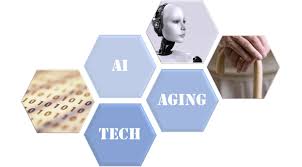26 of the 48 state Medicaid agencies studied could not report the number of “critical incidents” — such as abuse, neglect or exploitation.
You are here
From New Report: Future of AI and Older Adults
 New report published - Future of AI and Older Adults. From the findings; One of the media-fueled risks today with the plethora of AI-related hype is the tendency to find and publicize deficiencies and mistakes, reinforcing the premise that it is too early for benefits across industries like senior living or home care. This cycle was not helped by the behavior of earlier AI technologies like voice assistants. And there are barriers that need to be addressed to realize the full potential, which is not yet fully understood. These include:
New report published - Future of AI and Older Adults. From the findings; One of the media-fueled risks today with the plethora of AI-related hype is the tendency to find and publicize deficiencies and mistakes, reinforcing the premise that it is too early for benefits across industries like senior living or home care. This cycle was not helped by the behavior of earlier AI technologies like voice assistants. And there are barriers that need to be addressed to realize the full potential, which is not yet fully understood. These include:
Ethical dilemmas. With growing usage of AI technology, numerous ethical questions are emerging. These include questions of inherent bias in medical imaging or facial recognition software, but also in the category of remote monitoring. Consider patients whose behavior changes over time and whether they continue to give permission to being monitored.
Lack of interfaces to senior and health care systems. The lack of standardization of electronic records has been a major impediment to AI access and accuracy of retrieved information or assessment. For example, despite broad implementation of a tool to detect sepsis via EHR software, it turned out to do a poor job at detection, and worse, doctors did not really understand how it worked. Further, EHR technology lock-in by vendors, according to some, may be a limitation to patient information access and health system innovation.
Absence of responders to AI-generated alerts and trends. Remote monitoring processes depend on a well-trained response network which must deal with various alerts from sensors, cameras, voice-enabled devices, alarm systems, and edge devices – where a person is, but where there is no Wi-Fi or cloud access.
Escalating the risk of older adult scams. The conversational (and voice-enabled) nature of AI can make scams more prevalent. The Federal Trade Commission is already warning that AI can enable scammers to use an online audio clip to accurately clone the voice of a loved one.
From new report published: The Future of AI and Older Adults

Comments
From Adam Kaplan via LinkedIn
Incredible report on AI in Aging! Unbelievable to see the progress/potential from the report you published in ‘21. Gives me hope and optimism in regards to our ability to increase efficiency, engagement and quality of care! Thank you for sharing!